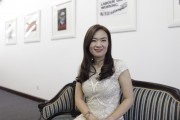“Unless your advertising contains a big idea, it will pass like a ship in the night.”
The wise words of David Ogilvy, the man who many cite as the ‘Father of Advertising’. In New York in 1948, David Ogilvy founded the agency that would become Ogilvy & Mather. It was based on an idea that for advertising to be successful – it must sell.
A few decades later Ogilvy arrived in the mainland in 1991, having previously established offices in Hong Kong in 1972 and in Taipei in 1985. The agency is now the largest in Greater China employing over 2,400 across 29 offices in 18 markets, spanning from first to third tier cities.
This year Ogilvy China celebrated its 20th Anniversary and chinaSMACK wanted to find out more about how the agency built a name for itself in the PRC and the main challenges it has faced over the last two decades.
To answer these questions and many more, are two individuals who have been instrumental in shaping Ogilvy’s success in Mainland China. So without further a do may I introduce, in their first ever joint interview, the agency’s Chairman T.B. Song and its CEO Shenan Chuang.
T.B. Song (right) is arguably one of, if not, the most experienced ad man in China with over 40 years of experience in the communications industry, 30 of which have been with Ogilvy. T.B. began his career in Taiwan in the 1970s. In 1991 he was named Chairman of Ogilvy & Mather China, with responsibility for the development of the mainland China market, starting with Shanghai. In 1998 he became a member of the Ogilvy & Mather Worldwide board.
Named on Campaign’s Global Power List 2010, T.B. is often recognised for his vast contributions to the Chinese ad industry and was honored as a ‘lifetime advisor’ to China 4A (China’s Association of Accredited Advertising Agencies), the industry body he helped to establish in 2006. That same year he was also selected as Chairman of WPP Greater China, a position he continues to hold today.
Shenan Chuang (left) has been with the agency for more than 27 years, also starting her Ogilvy career in the Taipei office and relocating to Beijing in 2003 as Chairman of Ogilvy’s Beijing Office. Her colleagues describe her as a “pacesetter and renowned professional” and in 2010 she was awarded the coveted ‘Agency Head of the Year Greater China’ award by Campaign Asia, a title she also won in 2006 when Ogilvy Beijing was simultaneously named Office of the Year in Asia.
Shenan has been driving Ogilvy forward in China and through her other role as three-time Chairman of the China 4As she has had a galvanizing effect in demonstrating the importance of advertising to brands in China. In 2010 her influence was recognised by Fortune China magazine which ranked her 23rd among the top businesswomen in China, while China Entrepreneur magazine also named her among the ‘Most Influential Female Business Leaders’.
A níhǎo and hello to both of you, and a very warm welcome to chinaSMACK. Can you tell us about your backgrounds, where were each of you brought up?
Shenan: I grew up with a big family in the culture city of Tainan in Taiwan. We lived in a courtyard style house in an urban area so it was a unique set up. My grandfather was a well-known goldsmith “ECD” in my hometown so I guess you can say I inherited a passion for creativity.
T.B.: I’m from Taiwan and I studied banking and management at a university in Taipei. I moved to Shanghai in 1991 when Ogilvy created a joint venture with Shanghai Advertising Group.
What were your first jobs when you graduated from university?
T.B.: My first job was at a local ad agency in Taipei called Guo Hua and I’ve been in this industry ever since. I worked in advertising for about 3.5 years before I joined Cathay Advertising (Guo Tai Jian Ye) in 1980.
Shenan: My first job was as a clerk at a trading company that exported raincoats. My mother found me that job even before my graduation because she was afraid that I wouldn’t be able to find a job. So I only had three days off between my university graduation and starting my first job. It didn’t last long though. In the first year of my career I tried four different jobs in the trading industry so I realized it wasn’t the right fit for me. It was that really dull year that convinced me to re-shape my dreams.
Why did you want to work in advertising?
T.B.: When I graduated from university it wasn’t easy to find a job. So through my father’s contacts I was able to get a job at a local agency called Guo Hua. I had been working there for a little while when I got another offer from a bank but by that time I didn’t want to leave even though the bank position offered a much higher salary of TWD 12,000. I only made TWD 3,500 a month at that time at Guo Hua.
Shenan: When I was growing up I always wanted to be a writer. In college I majored in history and became very interested in communications and journalism. At that time communications led to only two career paths – journalism and advertising. First I tried journalism. I sent out so many resumes but I couldn’t find a job.
So I decided I needed to change my career path so I tried advertising. I started as an assistant at a local agency in Taipei. They said I was overqualified for that job but I told them to just give me one year to prove that I could be a good account executive. So that’s where I started. My first account was Bristol Myers. It was a really good account to start with because it was an international client.
What drew you to work for Ogilvy & Mather?
Shenan: I wanted to work for an international agency because I thought they would be more professional. I was also very attracted to Ogilvy because I heard about all the training opportunities there and had read a lot about David Ogilvy and the Ogilvy culture. I joined Ogilvy because I wanted the training and I didn’t worry about my starting salary even though it was lower than at my previous job.
T.B.: Ogilvy entered my life when I was working at Cathay Advertising which was in joint venture talks with Ogilvy at the time. So I was part of the team that established a technical relationship between Cathay Advertising and Ogilvy & Mather Worldwide in 1981. This led to the introduction of western advertising concepts and systems into Cathay.
By 1985, when I’d been working for about 3 years I was managing the office of about 80 people as Deputy General Manager. In 1985, Cathay and Ogilvy & Mather created a joint venture company and Ogilvy & Mather Taiwan was established as the first agency in Taiwan with foreign investment. At that time I was Managing Director of the agency.
So why did Ogilvy & Mather go to China in the first place? What was the Shanghai office like in the beginning?
T.B.: Ogilvy’s first Greater China office opened in Hong Kong in 1972 and the second was in Taiwan in 1985. In 1991 we opened our first mainland rep office in Shanghai because our client Unilever wanted to move their Asia HQ to Shanghai so we signed a joint venture contract with Shanghai Advertising Group.

In the beginning: Ogilvy China management team (Worldwide CEO Miles Young, back row center; T.B., back row 3rd from left, and Shenan, front row 4th from left)
In 1992 we opened our Beijing rep office, then Guangzhou in 1993. In 1995 we launched the PR discipline then OgilvyOne in 1997. We worked closely with the regional management team to decide when to open which offices. Our first mainland client was Unilever and the second was VW Santana.
VW Santana Commercial, 1997 (Watch on Tudou or Youtube – requires VPN in China)
This TVC shows a VW Santana cruising through different parts of China, from urban to rural areas and from deserts to rivers. The campaign’s slogan, “With Santana, there is no fear wherever you go” was used for nearly a decade.
In Shanghai we started with 20 people. Everyone was either senior management or entry level. There weren’t any middle managers back then. We had to hire people with no experience in advertising or marketing as the industry was so new. So we placed a one line ad in Xinmin Evening News that said “Happy workplace”. We received 1,200 applications. Because the industry was so new to China then it was difficult to hire people with any advertising or marketing experience so we recruited artists, designers and professors of marketing and literature. All staff were local hires with the exception of the Taiwanese expats. Fortunately it wasn’t too difficult to convince people to join us because so many people wanted to join MNCs and we paid more than the average salary. Entry level salaries at that time started at 200-300 RMB per month.
Our first Westerner or ‘lǎowài’ was Scott Kronick who came to Taiwan from our New York office in 1990. Scott is still with us in Beijing today as President of Ogilvy PR, North Asia.
When we first started out all of our clients were Multinationals that wanted to enter China and we worked with people from their sales departments. Many of the TVCs we ran then were 30 second spots because it was cheaper back then. Now it’s mostly 15-second ads.
In the early days the most difficult part was training staff because improving professional skills takes time and experience. Back then people thought it would be impossible to train mainland staff to become managers. If you look around our offices today you’ll see how wrong they were! We have so many very capable and locally trained managers now.
A funny memory I have of those early days is that many of our staff would stay and discuss work at the General Manager’s house. They would even shower at his place because many apartments didn’t have private showers at that time.
Sanyuan Milk, 1998 (Watch on Tudou)
Directed by acclaimed film director Jiang Wen, this 1998 TVC tugs on heartstrings by depicting a sister’s love for her younger brother at a time in history when few Chinese could afford to drink milk every day. The sister pretends not to like milk so that she can give it to her brother. Years later, the now grown up brother discovers that his sister actually loved milk and was deeply touched by her generosity and thoughtfulness.
What were Ogilvy’s original goals and objectives in China?
T.B.: Our objectives have been very clear from the start:
- Localize Ogilvy in the China market
- Help MNCs enter China
- Help Chinese brands to achieve greater success in China through branding and marketing
- Train local Chinese staff to understand and lead the advertising business
Our first ever Chinese clients were Shanghai Jiahua (a manufacturer of detergent and cleaning supplies) and Lengsuanling, a toothpaste brand from Chongqing, Sichuan.
Do you feel that 20 years on these goals have been achieved?
T.B.: Yes definitely. Given the chance to redo the last two decades, I wouldn’t really do anything differently.
How are you celebrating the 20 year milestone?
Shenan: Each of Ogilvy’s offices in mainland China celebrated our 20th anniversary in their own ways. To deepen Ogilvy’s ‘roots’ in China, Beijing staff spent an afternoon planting trees and ended the night with a party honoring long-time staff who have helped grow Ogilvy Beijing over the past 20 years.
To celebrate David Ogilvy’s centennial which fell around the same time, we asked staff to share their own creativity by submitting their own artwork that they create in their free time. So the Beijing office’s ‘O Gallery‘ is now exhibiting 100 pieces of artwork created by 100 staff members. The Shanghai office invited all their staff and alumni to join a big 20th anniversary party at a blues and jazz club.
The O Gallery and examples from the ‘Ogilvy 100’ collection

An alumni party was also held at the Guangzhou office, with live performances and recognition given to Ogilvy staff. We’re also taking the opportunity to celebrate publicly by sharing our story through various social media activities on our Ogilvy Weibo and Twitter.
Each of you has been at Ogilvy for around 30 years. How come you have both stayed so long especially in an industry where people are moving all the time?
Shenan: This is my 27th year at Ogilvy and I’ve never wanted to leave because my role has continually evolved during my time here. Every stage has offered new challenges, different rules and I have enjoyed working with so many people, different leaders, partners and teams. We’ve become friends and family to one another over the years. This job has allowed me to grow and become a better person.
TB: Like Shenan, the main reason I have stayed so long is because my role and work have constantly evolved. There are always new things to do and I like the culture of this company. We respect people, knowledge and creativity. Of these, people are the most important. We value training and development. Another reason is because our regional and global leadership have always respected China and treat us as valued partners. Of course we’ve become friends now after working together for so long and I really enjoy working alongside people that want to achieve something together that we can be proud of.
IBM “Xinjiang”, 2001 (Watch on Tudou)
After the Internet bubble burst, IBM pioneered the e-commerce solution in 2001 with a series of TVCs that generated lots of buzz and a lasting impact. This commercial takes a humorous approach by featuring Xinjiang farmers who use the Internet to expand their business beyond geographic boundaries.
What do the next 20 years hold for Ogilvy in China? What are the plans?
T.B.: The challenge for us is to continue to create creative, effective, impactful and influential work. The Ogilvy Group will continue its digital transformation to become a 360 Degree Digital agency. Integration among the disciplines will become increasingly important. That said, we still think there’s a need to maintain the distinct disciplines. We will also continue to evolve as content creators.
How do you both inspire your colleagues at the Chinese offices?
Shenan: The most effective way of inspiring our colleagues is to give them the freedom and opportunities to pursue work and projects that they are interested in. This is crucial.
In addition to this, we also think the ambiance of the work environment is very important because everyone spends so much time in the office. One of my first projects when I moved to Beijing was to create an inspiring office space. I wanted to change people’s mind sets. This is advertising. Advertising should be fun. And we’re not only advertising, we have PR, all the communications should be creativity driven. It’s not just about business.
In the Beijing office we have a floor where creatives from every discipline sit together on the tenth floor. We call it the creative floor. It’s probably the first office that encourages all the creatives to sit together in one place. To build a creative ambience, we gave them artistic furniture, and a unique atmosphere where even the stationery is unique. Even the color of the walls is different. We were the first office in Ogilvy to initiate and implement this idea. When our former Regional Director and current Ogilvy & Mather Worldwide CEO Miles Young, came and saw this he made sure every office in the region had their creatives sitting together on the same floor as well. This is something I’m very proud of.
Art also has deep roots in our corporate culture. In 2005 we established the ‘O Gallery’, an in-house art exhibition located at the reception area of our Beijing office. Paintings, photographs, sculptures, avant-garde furniture and 3D installations fill the walls and spaces of the O Gallery. We view it as a platform for inspiring staff while discovering and fostering a diverse group of young talents from around Greater China.
Our offices in Guangzhou and Shanghai (below) also have very creative and interesting designs. The Guangzhou office has a “Carnival of Ideas” theme complete with horses from merry go rounds. In Shanghai we just unveiled our newly renovated office space this month too. The new design is very eco-conscious.
Recently we also created the new position of Chief Creative Officer, China so that there is creative leadership and someone who can mobilize all our creative resources across disciplines and markets. We hired Graham Fink, London’s number one creative director, to fill this role. He joined us this summer. We also sent our staff to attend the Cannes Lions International Advertising Festival this year and people always return from Cannes very inspired.
Finally, we use all our company events as a platform for demonstrating how creativity can play a role. Each year the company sponsors all staff to take part in the company trip where they are given the option of several domestic and international vacation destinations that they can travel to. They don’t need to work during these trips, we just want people to go out and explore new places and experience new things.
We also host regular Inspiration Days with various guest speakers from different fields, have wild Chinese New Year parties where teams dress up and compete against each other in very elaborate and creative performances, host Movie Days where staff can take a few hours off to go see the latest blockbusters, Sports Days and there are many more examples…
What inspires you both?
T.B.: China inspires me because there is so much unfinished business here and there are so many gaps to fill. There’s always more to be doing, new challenges to overcome and more to learn.
Shenan: Anything related to creativity, not only creativity in advertising or communications. Literature, film, art, travel. I have friends of all ages who work in so many different industries. I find all of these things inspiring.
Do you think Chinese children are given the opportunity or even encouraged to be creative in Chinese schools?
 Shenan: From what I’ve observed it seems that the school system here focuses more on practical subjects such as math, science and economics and less on “softer” sciences such as religion and art.
Shenan: From what I’ve observed it seems that the school system here focuses more on practical subjects such as math, science and economics and less on “softer” sciences such as religion and art.
Without studying these subjects it may be harder for children to find areas of inspiration. But this is something that I think someone’s career can provide, after they finish school of course.
As a company we want to take responsibility for creating a platform where our staff can continue their education in areas that may have been missing from their school curriculum.
At Ogilvy we always look for new ways to encourage creativity in our staff. We do small things like featuring their art work in our O Gallery to bigger things like organizing an annual company trip where staff are encouraged to take a few days of vacation to travel to new places that they haven’t seen before. Seeing and experiencing new things leads to greater creativity.
What are your opinions on Chinese Ad agencies’ entries to this year’s Cannes Lions Festival?
Shenan: I think the China entries were pretty good. It is very inspiring for young Chinese ad agencies and professionals to attend this global gathering of the world’s top creative visionaries. I think Chinese clients should send their marketing teams there to understand it. Every year we send our Young Suits and Creatives to attend.
This year 10 submissions from China were shortlisted at Cannes; five were from Ogilvy and three of ours won Lions including campaigns for Volkswagen, Greenpeace and a social marketing campaign for the Shanghai Public Health Bureau.
Is there any advice you would give to young Chinese graduates hoping to find a job in China’s ad industry?
Shenan: Seize life! And grab any opportunities you can to try and experience things. Follow me on Weibo, read David Ogilvy’s books, look at advertising related things, do internships, fellowships, projects. Be creative in how you apply for jobs.
For example, our new Chief Creative Officer Graham Fink told us how he once dressed up as an old man when an agency he applied to told him that they were looking to hire someone more senior. And he got the job! When I was working in Taiwan, an applicant sent us well written, thoughtful and insightful letters seven times. Now he’s the Chief Strategic Officer of Ogilvy Taiwan Group. But you can’t use these ideas because you have to come up with your own original ideas to be truly creative.
What do people need to do to impress you both?
Shenan: They have to have a point of view. People that impress me have hobbies, interests and a passion for creativity.
T.B.: I also admire people with a point of view, even if I disagree with them.
Bit of an odd one, but to what extent do Confucian values play an important role in Chinese advertising?
Shenan: Advertising is a reflection of society. It’s a part of our history. It’s a part of the cultural root so you cannot deny that Confucian values will influence it somehow. But you can’t take it at face value, you have to do something beyond the obvious.
Johnson & Johnson, 2008 (Watch on Tudou)
Released as part of J&J’s 2008 Beijing Olympics campaign, this commercial features doctors, teachers and coaches as giants among humanity who do small things with great love to comfort and to care, demonstrating Johnson & Johnson’s slogan, “Because we care, we act.”
Something people outside China always ask, why are Shanzhai goods so popular in China? How do you feel about the recent discovery of the fake Apple Store in Kunming province?
Shenan: There are so many people in China and a big income disparity creates a demand for cheaper goods that people can actually afford. Of course we think it’s not right, Chinese people should respect brands and the Government should take action to help stop such things from happening. They must consider the impact on the country’s image. As long as a society appreciates authentic brands, acknowledges their real value and respects intellectual property (including through legal means when need be), then there will be less demand for Shanzhai goods.
Is plagiarism a problem for the Chinese ad industry?
T.B.: Obviously I don’t condone plagiarism, but to some extent, copying is a way of learning when a person or industry is still in its early stages.
Shenan: Creatives everywhere despise plagiarism. I think plagiarism is more of a self-discipline issue. Sometimes people can take a creative approach and tweak it but their core idea was not an original one. I think this does happen in China, but all the truly great ideas are original ones. This type of thing happens everywhere but perhaps more so in China as the industry is still developing here.
Japan, although changing, has a reputation for inequality between the sexes. Is the same thing true in China? And in the Chinese Ad industry? Are women given just as much opportunity as men?
Shenan: In China women have even 100 times more power than they do in Japanese culture. Our industry is very open to women. We will see more and more female leaders. So we even need to make sure we have enough men working for our agencies to balance things out. We sometimes actually need to shelter the men!
On that note, are Chinese women just as ambitious as Chinese men?
Shenan: Of course! Most young women are quite ambitious but sometimes their career plans get sidetracked by the realities of life like having children, taking care of the family, etc. I think if the society has a strong, supportive structure women will have more time to spend on their careers.
T.B.: Some Chinese women are very ambitious, perhaps even more so than men. But there is also a young generation which seems like they want to go back to the days of being housewives because their husbands or families may have enough money now to allow them to live comfortable lives without working. But you can’t really generalize; there are too many people in China to do so and there are all different types of people.
A question for Shenan, you have a rather impressive following of over 1 million people on Sina Weibo. How do Chinese social media platforms compare to those of the Western world?
 Shenan: Sina Weibo actually has more to offer and is more attractive than Twitter, in my opinion. This is a good example of what we discussed before about plagiarism in China. While Weibo or other Chinese social media equivalents of those created in the west may not stem from original ideas, they have found ingenious ways to improve upon the original ideas and products and the adaptations are actually better than the originals.
Shenan: Sina Weibo actually has more to offer and is more attractive than Twitter, in my opinion. This is a good example of what we discussed before about plagiarism in China. While Weibo or other Chinese social media equivalents of those created in the west may not stem from original ideas, they have found ingenious ways to improve upon the original ideas and products and the adaptations are actually better than the originals.
In China microblogging has had a major impact on society in so many ways; it encourages the sharing of ideas which leads to greater knowledge, open-mindedness and more creativity in society.
So T.B. is there a reason you don’t also endulge in Sina Weibo? Are you on any social media?
T.B.: For me, personally, Weibo is just too much information, some of which is unnecessary. I look at it sometimes on my son’s account. I am on Facebook though and recently put up my photo after a former colleague criticized me for not having one up for so long. I tried twice before to put it up but it never worked!
Do either of you have any life lessons that you would like to pass on to the next generation?
Shenan: We’re not done yet! We’re still learning!
Finally, what are you both most proud of in your careers to date?
T.B.: I think we still have a long road ahead. But if I had to choose I’d say I’m most proud of the role we’ve played in developing the advertising and marketing communications industry in China, that we helped so many people to understand branding and its importance, and that we played a part in so many people choosing this business as a career.
Shenan: I’m most proud of all the local leaders we’ve groomed and the long retention of our people. We treasure partnerships and some of my colleagues are like family members to me.
To finish, a slightly surreal music video from the Shanghai office (Watch on Tudou).
Thank you and xiè xiè T.B. and Shenan
A special thanks to Sarah Guldin for all her help with arranging the interview.
Click below to like us on Facebook.
.























